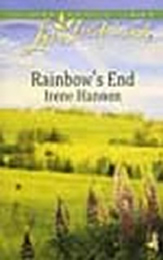Sucker for Romance?
Rainbow’s End © 2007 by Irene Hannon
© 2007 Beth Helstien
Generally, I am not much of a genre reader. “Genre reader, what’s that?” you may wonder. In library-speak, we think of genre fiction as those books you can lump together and call “mysteries” or “thrillers” or “westerns” or “science fiction” or “romance.” Some people head straight to the library mystery or science fiction sections, and hardly ever read anything else. I like to mix it up, and I like to mix other people up.
So, in the spirit of stirring things up, I set out to explore an entirely new-to-me genre: Christian romance. For the daughter of two secular Jews, my decision to study comparative religion in college took most of my family by surprise. Later, my decision to become a Universal Life minister surprised my friends at high tech Luxel Corporation, who saw me as technical writer and a bean counter.
If the content of some of my favorite fiction might challenge some readers for its dark side or sexual nature, the content of Rainbow’s End might challenge others for its genre-orientation—the cover calls it inspirational, and many readers call it Christian. I thought Rainbow’s End turned out to a surprisingly enjoyable moment.
Right from the start, you know the two protagonists are going to fall in love and be healed. Keith wakes up feeling different the day after he meets Jill. The author attributes the change to the summer storm and the magic powers of Orcas Island. Since I knew they were going to fall desperately in love, I anticipated a passionate embrace, but the genre doesn’t work that way. Chastity and propriety prevail. Unrelenting hopefulness—not sexual heat—pushes the story on.
The complete predictability of the plot is one of the charms. The characters are from our caricatures of ourselves as islanders—the reclusive young artist, the itinerant carpenter, the hermit in the forest. The reader knows all along that everything is in the Lord’s hands and everything is going to turn out just fine, and so it isn’t necessary to worry about a thing. The pages fly by; the depictions of Orcas are engaging and largely accurate. The lovers do their dance: step together, step apart, step together.
Healing by love, lives restored to balance, a family founded on acceptance and giving—these principles of Christian fiction could well grace all our lives to the better. Christian, Jew, atheist or undecided, don’t we all crave redemption, love? Wouldn’t we all welcome grace transforming our scarred lives?
Sad to say, however, that while the writing is acceptable, nowhere is it breathtaking, beautiful. In Rainbow’s End, the formulaic nature of the Christian genre too often translates into formulaic plot, character, and sentences. Too bad. It feels like the novel’s themes deserve better. I guess it’s a tall order.
Rainbow’s End, like all books reviewed here, may be found at the San Juan Island Library.
